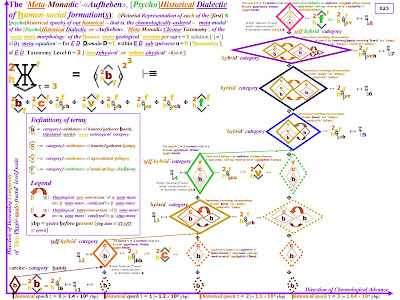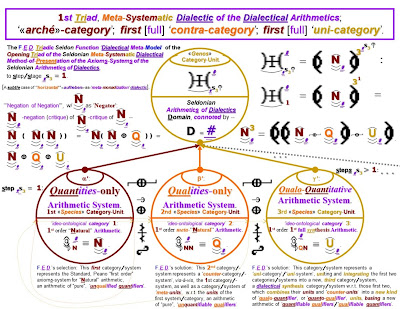"The historical precursors of Marx's ultimate systematic-dialectical <<arche'>> for his critique of the capitalist system, and also of the prevailing <<mentalite'>> of modern society -- namely, his "Elementary Form of Value" -- are also the '''psychohistorical''' roots of the one-sided, abstractly "purely-quantitative" arithmetics, algebras, and mathematics-in-general that enfetter technological, scientific and mathematical progress in the "modern" [capitalist] epoch."
This is particularly so with respect to achieving "closed form", "analytical", comprehensive function-solutions -- and to transcending the supposedly "infinite" singularities to which nonlinear differential equations and their known solution-functions are particularly prone -- to the nonlinear differential equations that form the best modern expressions of the "laws" -- or "habits" [cf. Peirce] -- of Nature."
"These nonlinear differential equations include the Newton gravitic equations for more than two gravitating bodies, the Einstein General Relativity Field Equations, The Navier-Stokes Equations, the Klimontovich Equation for plasmas, and the Maxwell-Boltzmann-Vlasov equation, also for [fusional] plasmas, and with the exception of the linear Schroedinger equation of Quantum Mechanics."
-- Karl Seldon
Marx’s Mathematical Manuscripts.
Dear Reader,
The following is an
excerpt from that blog-entry --
“Marx’s
Mathematical Manuscripts must be seen as an outstanding
model of dialectical practice. . ..”
I posted the following comment on this blog-entry:
“Marx’s draft writings on the calculus -- “Marx’s
Mathematical Manuscripts” -- never prepared for publication by Marx during his
lifetime, and only published posthumously -- should be grasped as the
beginnings of a dialectical, immanent critique of the then-prevailing
mathematical ideologies regarding the integro-differential calculus of Leibniz,
Newton, and beyond, much as Marx had applied his dialectical method of immanent
critique to the ideology-infested science of classical political economy in the
volumes of his treatise “Das Kapital”. In the latter work, too, there are ‘protoic’
fruitions of such an immanent critique of the ideologies enfettering modern
mathematics, e.g., in the explicitly ‘qualified quantities’ and ‘quantified
qualities’ of his commodity-capital and money-capital value-sums,
distinguished, often by subscript, into constant capital, variable capital, and
surplus-value components.
An immanent critique of modern mathematics as an
ideology-infested science, in the Marxian sense of "ideology", leads
to the foundation of a new mathematics -- just as the immanent critique of
classical political economy as an ideology-infested science led, in
“Das
Kapital”, to the foundations of a new, Marxian, socio-politico-economic
science -- including the 'dialectical ideography', or "mathematics of
dialectics", developed by
Foundation Encyclopedia
Dialectica [
F.E.D.].
Their work is available for free-of-charge
download via
www.dialectics.info .”
Regards,
Miguel



















































